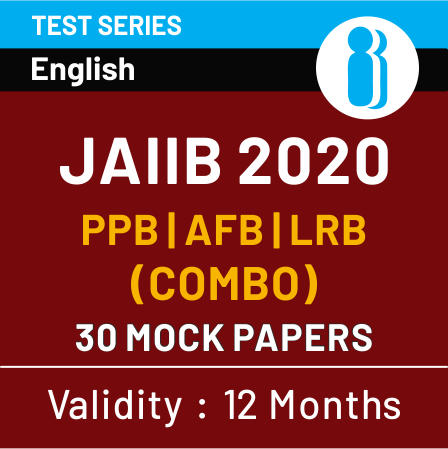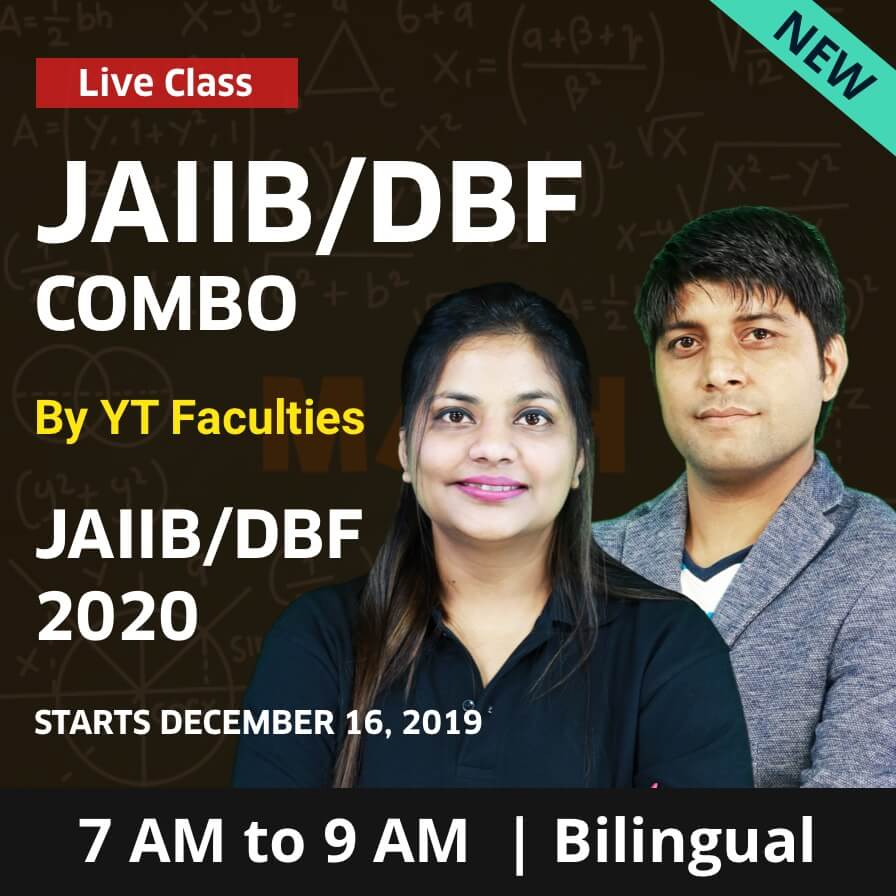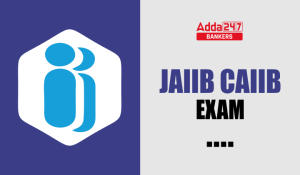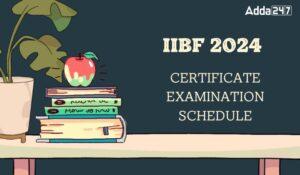Dear Readers,
So, in the previous articles, we read
and discussed about JAIIB/DB&F, exam pattern, Eligibility, Schedule,
Registration fees and some other introduction about the same.
and discussed about JAIIB/DB&F, exam pattern, Eligibility, Schedule,
Registration fees and some other introduction about the same.
Now, in this article, we will be
discussing about the JAIIB/DB&F Subjects and Syllabus of PAPER I subject in details.
discussing about the JAIIB/DB&F Subjects and Syllabus of PAPER I subject in details.
SUBJECTS OF EXAMINATION:
(1) Principles & Practices of Banking, (Paper 1)
(2) Accounting & Finance for Bankers, (Paper 2)
(3) Legal & Regulatory Aspects of Banking (Paper 3)
PAPER I –
PRINCIPLES & PRACTICE OF BANKING
This Paper 1 Subject is divided into four Parts (A,B,C and D)
PRINCIPLES & PRACTICE OF BANKING
This Paper 1 Subject is divided into four Parts (A,B,C and D)
PART A – INDIAN FINANCIAL SYSTEM
Indian Financial System – An Overview
Role of
RBI, Commercial Banks, NBFCs, PDs, FIs, Cooperative Banks, CRR, SLR; Equity
& Debt Market; IRDA
RBI, Commercial Banks, NBFCs, PDs, FIs, Cooperative Banks, CRR, SLR; Equity
& Debt Market; IRDA
Banking
Regulation
Regulation
Constitution, Objectives, Functions of
RBI; Tools of Monetary Control; Regulatory Restrictions on Lending
RBI; Tools of Monetary Control; Regulatory Restrictions on Lending
Retail
Banking, Wholesale and International Banking
Banking, Wholesale and International Banking
Retail Banking- Products,
Opportunities; Wholesale Banking, Products; International Banking, Requirements
of Importers & Exporters, Remittance Services; Universal Banking; ADRs;
GDRs; Participatory Notes.
Opportunities; Wholesale Banking, Products; International Banking, Requirements
of Importers & Exporters, Remittance Services; Universal Banking; ADRs;
GDRs; Participatory Notes.
Role
of Money Markets, Debt Markets & Forex Market
of Money Markets, Debt Markets & Forex Market
Types of
Money & Debt Market Instruments incl. G-Secs; ADs, FEMA, LIBOR, MIBOR, etc.
Money & Debt Market Instruments incl. G-Secs; ADs, FEMA, LIBOR, MIBOR, etc.
Role
and Functions of Capital Markets, SEBI
and Functions of Capital Markets, SEBI
Overview of Capital Market; Stock
Exchange; Commonly used Terms; Types of Capital Issues; Financial Products /
Instruments including ASBA, QIP; SEBI; Registration of Stock Brokers,
Sub-brokers, Share Transfer Agents, etc QIBs
Exchange; Commonly used Terms; Types of Capital Issues; Financial Products /
Instruments including ASBA, QIP; SEBI; Registration of Stock Brokers,
Sub-brokers, Share Transfer Agents, etc QIBs
Mutual
Funds & Insurance Companies, Bancassurance & IRDA
Funds & Insurance Companies, Bancassurance & IRDA
Types of Mutual Funds, its Management
& its Role; Role & Functions of Insurance Companies; Bancassurance;
IRDA
& its Role; Role & Functions of Insurance Companies; Bancassurance;
IRDA
Factoring,
Forfaiting Services and Off-Balance Sheet items
Forfaiting Services and Off-Balance Sheet items
Types &
advantages of Factoring & forfaiting services; Types of off balance sheet
items
advantages of Factoring & forfaiting services; Types of off balance sheet
items
Risk
Management, Basel Accords
Management, Basel Accords
Introduction to Risk Management; Basel
I, II & III Accords
I, II & III Accords
CIBIL,
Fair Practices Code for Debt Collection, BCSBI
Fair Practices Code for Debt Collection, BCSBI
Role and Functions of CIBIL; Fair
Practices Code for Debt Collection; Codes of BCSBI
Practices Code for Debt Collection; Codes of BCSBI
Recent
Developments in the Financial System
Developments in the Financial System
Structure,
Reforms in the Indian Financial System; recent developments in Money, Debt,
Forex Markets; Regulatory Framework; Payments and Settlement System
Reforms in the Indian Financial System; recent developments in Money, Debt,
Forex Markets; Regulatory Framework; Payments and Settlement System
PART B – FUNCTIONS OF BANKS
Banker Customer
Relationship
Relationship
Types; Different Deposit Products & Services; Services to Customers
& Investors
& Investors
KYC
/ AML / CFT norms
/ AML / CFT norms
PMLA
Act; KYC Norms
Act; KYC Norms
Bankers’
Special Relationship
Special Relationship
Mandate;
POA; Garnishee Orders; Banker’s Lien; Right of Set off
POA; Garnishee Orders; Banker’s Lien; Right of Set off
Consumer
Protection – COPRA, Banking Ombudsman Scheme
Protection – COPRA, Banking Ombudsman Scheme
Operational
Aspects of COPRA Act & Banking Ombudsman Scheme
Aspects of COPRA Act & Banking Ombudsman Scheme
Payment
and Collection of Cheques and Other Negotiable Instruments
and Collection of Cheques and Other Negotiable Instruments
NI
Act; Role & Duties of Paying & Collecting Banks; Endorsements; Forged
Instruments; Bouncing of Cheques; Its Implications; Return of Cheques; Cheque
Truncation System
Act; Role & Duties of Paying & Collecting Banks; Endorsements; Forged
Instruments; Bouncing of Cheques; Its Implications; Return of Cheques; Cheque
Truncation System
Opening
accounts of various types of customers
accounts of various types of customers
Operational
Aspects of opening and Maintaining Accounts of Different Types of Customers
including Aadhaar, SB Rate Deregulation
Aspects of opening and Maintaining Accounts of Different Types of Customers
including Aadhaar, SB Rate Deregulation
Ancillary
Services
Services
Remittances;
Safe Deposit Lockers; Govt. Business; EBT
Safe Deposit Lockers; Govt. Business; EBT
Cash
Operations
Operations
Cash
Management Services and its Importance
Management Services and its Importance
Principles
of lending, Working Capital Assessment and Credit Monitoring
of lending, Working Capital Assessment and Credit Monitoring
Cardinal
Principles; Non-fund Based Limits; WC; Term Loans; Credit Appraisal Techniques;
Sources of WC Funds & its Estimation; Operating Cycle; Projected Net WC;
Turnover Method; Cash Budget; Credit Monitoring & Its Management; Base Rate
Principles; Non-fund Based Limits; WC; Term Loans; Credit Appraisal Techniques;
Sources of WC Funds & its Estimation; Operating Cycle; Projected Net WC;
Turnover Method; Cash Budget; Credit Monitoring & Its Management; Base Rate
Priority
Sector Advances
Sector Advances
Targets;
Sub-Targets; Recent Developments
Sub-Targets; Recent Developments
Agricultural
Finance
Finance
Types
of Agricultural Loans; Risk Mitigation in agriculture (NAIS, MSP etc.)
of Agricultural Loans; Risk Mitigation in agriculture (NAIS, MSP etc.)
Micro,
Small and Medium Enterprises
Small and Medium Enterprises
MSMED Act,
2006 Policy Package for MSMEs; Performance and Credit Rating Scheme; Latest
Developments
2006 Policy Package for MSMEs; Performance and Credit Rating Scheme; Latest
Developments
Government
Sponsored Schemes
Sponsored Schemes
SGSY; SJSRY; PMRY; SLRS
Self
Help Groups
Help Groups
Need for & Functions of SHGs; Role
of NGOs in Indirect Finance to SHGs; SHGs & SGSY Scheme; Capacity Building
of NGOs in Indirect Finance to SHGs; SHGs & SGSY Scheme; Capacity Building
Credit
Cards, Home Loans, Personal Loans, Consumer Loans
Cards, Home Loans, Personal Loans, Consumer Loans
Operational Aspects, Advantages,
Disadvantages & Guidelines of Credit Cards; Procedure and Practices for
Home Loans, Personal Loans and Consumer Loans
Disadvantages & Guidelines of Credit Cards; Procedure and Practices for
Home Loans, Personal Loans and Consumer Loans
Documentation
Types of Documents; Procedure;
Stamping; Securitisation
Stamping; Securitisation
Different
Modes of Charging Securities
Modes of Charging Securities
Assignment; Lien; Set-off;
Hypothecation; Pledge; Mortgage
Hypothecation; Pledge; Mortgage
Types
of collaterals and their characteristics
of collaterals and their characteristics
Land & Buildings; Goods;
Documents of Title to Goods; Advances against Insurance Policies, Shares, Book
Debts, Term Deposits, Gold, etc; Supply Bills
Documents of Title to Goods; Advances against Insurance Policies, Shares, Book
Debts, Term Deposits, Gold, etc; Supply Bills
Non
Performing Assets
Performing Assets
Definition; Income Recognition;
Asset Classification; Provisioning Norms; CDR
Asset Classification; Provisioning Norms; CDR
Financial Inclusion
BC; BF; Role of ICT in Financial
Inclusion, Mobile based transactions, R SETI
Inclusion, Mobile based transactions, R SETI
Financial
Literacy
Literacy
Importance of financial literacy,
customer awareness
customer awareness
PART C – BANKING TECHNOLOGY
Essentials
of Bank Computerization
of Bank Computerization
Computer Systems; LANs; WANs; UPS;
Core Banking
Core Banking
Payment
Systems and Electronic Banking
Systems and Electronic Banking
ATMs; HWAK; PIN; Electromagnetic
Cards; Electronic Banking; Signature Storage & Retrieval System; CTS; Note
& Coin Counting Machines; Microfiche;
Cards; Electronic Banking; Signature Storage & Retrieval System; CTS; Note
& Coin Counting Machines; Microfiche;
NPC; RUPAY
Data
Communication Network and EFT systems
Communication Network and EFT systems
Components & Modes of
Transmission; Major Networks in India; Emerging Trends in Communication
Networks for Banking; Evolution of EFT System; SWIFT; Automated Clearing
Systems; Funds Transfer Systems; Recent Developments in India
Transmission; Major Networks in India; Emerging Trends in Communication
Networks for Banking; Evolution of EFT System; SWIFT; Automated Clearing
Systems; Funds Transfer Systems; Recent Developments in India
Role
of Technology Upgradation and its impact on Banks
of Technology Upgradation and its impact on Banks
Trends in Technology Developments;
Role & Uses of Technology Upgradation; Global Trends; Impact of IT on Banks
Role & Uses of Technology Upgradation; Global Trends; Impact of IT on Banks
Security
Considerations
Considerations
Risk Concern Areas; Types of
Threats; Control Mechanism; Computer Audit; IS Security; IS Audit; Evaluation
Requirements
Threats; Control Mechanism; Computer Audit; IS Security; IS Audit; Evaluation
Requirements
Overview
of IT Act
of IT Act
Gopalakrishna Committee
Recommendations
Recommendations
Preventive
Vigilance in Electronic Banking
Vigilance in Electronic Banking
Phishing; Customer Education; Safety
Checks; Precautions
Checks; Precautions
PART D – SUPPORT SERVICES – MARKETING
OF BANKING SERVICES / PRODUCTS
OF BANKING SERVICES / PRODUCTS
Marketing
– An Introduction
– An Introduction
Concept; Management; Products &
Services; Marketing Mix; Brand Image
Services; Marketing Mix; Brand Image
Social
Marketing / Networking
Marketing / Networking
Evolution, Importance &
Relevance of Social Marketing / Networking
Relevance of Social Marketing / Networking
Consumer
Behaviour and Product
Behaviour and Product
Consumer Behaviour; Product
Planning, Development, Strategies, etc; CRM
Planning, Development, Strategies, etc; CRM
Pricing
Importance, Objectives, Factors,
Methods, Strategies of Pricing; Bank Pricing
Methods, Strategies of Pricing; Bank Pricing
Distribution
Distribution Channels; Channels
for Banking Services; Net Banking; Mobile Banking
for Banking Services; Net Banking; Mobile Banking
Channel
Management
Management
Meaning, Levels, Dynamics,
Advantages
Advantages
Promotion
Role of Promotion in Marketing;
Promotion Mix
Promotion Mix
Role
of Direct Selling Agent / Direct Marketing Agent in a bank
of Direct Selling Agent / Direct Marketing Agent in a bank
Definition; Relevance; Banker as
DSA / DMA; Delivery Channels in Banks; Benefits
DSA / DMA; Delivery Channels in Banks; Benefits
Marketing
Information Systems – a longitudinal analysis
Information Systems – a longitudinal analysis
Functions & Components of MKIS;
MKIS Model; Use of Computers & Decision Models; Performance of MKIS;
Advantages
MKIS Model; Use of Computers & Decision Models; Performance of MKIS;
Advantages
On the very next upcoming Articles, we will
be discussing about the Syllabus of Paper 2 in detail, about the
subjects and how to plan for it, study for it, and finally we together will
start the preparation for these.
be discussing about the Syllabus of Paper 2 in detail, about the
subjects and how to plan for it, study for it, and finally we together will
start the preparation for these.
We want our readers to be on the top of every profession specially
our Banking aspirants and bankers who think that there is no way to stop where
you are and there is never a stop to your growth. And believe us You can’t miss
these courses. It is not mandatory but yes it is very very important for your
knowledge and growth in any banking or financial institution.
our Banking aspirants and bankers who think that there is no way to stop where
you are and there is never a stop to your growth. And believe us You can’t miss
these courses. It is not mandatory but yes it is very very important for your
knowledge and growth in any banking or financial institution.
For any query/issue/support/guidance related to IIBF, JAIIB or DB&F, you can contact us through: http://support.adda247.com
Important Links
Important Links
You may also like to read:




 JAIIB CAIIB 2024, Exam Schedule, Eligibi...
JAIIB CAIIB 2024, Exam Schedule, Eligibi...
 IIBF Certificate Exam 2024 Schedule Out,...
IIBF Certificate Exam 2024 Schedule Out,...
 CCP Admission 2023 Requirement, Course D...
CCP Admission 2023 Requirement, Course D...



